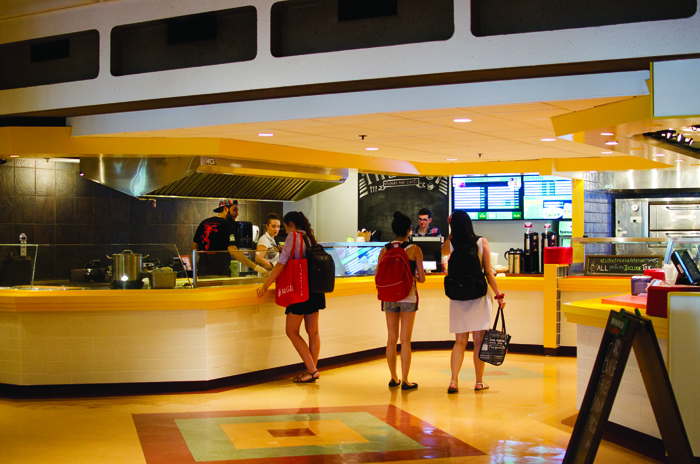On Aug. 24 a new, yet to be named food operation opened alongside The Nest in the Students’ Society of McGill University (SSMU) cafeteria. Together, the two services will form the Student-Run-Café (SRC).
The new food operation sells items such as burgers and pizza, while The Nest has added a full pasta bar. Menu items are clearly differentiated between the two food operations, with little overlap in what each location sells.
According to SSMU Vice-President (Finance & Operations) Zacheriah Houston, the new food operation will increase the variety of food options sold at the SRC while allowing The Nest to maintain its original mandate as a sustainability hub.
“Students were very clearly asking for more meat, but it didn’t fit the vision of The Nest,” Houston said. “The new café will have more meat and a wider variety and selection of food, but it’ll definitely be offering vegan and gluten-friendly options [too].”
The new food operation will be situated in the space formerly occupied by Bocadillo, a food service provider whose lease expired in June, 2015.
Bocadillo’s departure followed the earlier exit of Bambou Bol in March 2015, which occurred due to the latter’s failure to pay rent. SSMU Vice-President (Clubs & Services) Kimber Bialik noted that these departures enabled SSMU to move forward with its mandate to prioritize student space.
“It was a mix of good timing with […] those leases […] ending, and when we were ready to mobilize with [the SRC].” Bialik said.
The creation of the SRC follows a series of motions passed by SSMU to prioritize student space in the Shatner Building, while minimizing the presence of corporate efforts on campus : one such motion, the “Confidential Motion Regarding the Future of Food Services in the University Centre”—which was confidential at the time because it dealt with ongoing lease negotiations with Bocadillo—was passed on March 26. It mandates that SSMU work towards removing commercial tenant activity from the Shatner Building. The motion also prevents any new agreements with commercial tenants without the explicit approval of SSMU Legislative Council.
According to Houston, the decision to forgo a commercial tenant in favour of another student-run operation was difficult, given the uncertainty that the SRC will immediately produce a profit.
“We were giving up guaranteed revenue [from a commercial tenant] for revenue that could be more favourable for [SSMU] or could be worse,” Houston explained. “We have pretty high hopes given the amount of traffic that used to go through the cafeteria and also based on how well The Nest did during the last term.”
While The Nest ran a deficit of nearly $20,000 during its first semester of operation, Winter 2014, Houston does not foresee a similar setback for the new food operation.
“The new operation will definitely be budgeted for a surplus because [it] replaced a commercial tenant; so financially, it’s not really an option to run a deficit,” Houston said. “The Nest […] had [a] really high food cost percentage compared to any other restaurant that I’ve looked at because local, diet-sensitive food is expensive.”
Currently, there will be no option for students to pay for food at either The Nest or the new food operation using a McGill meal plan. Houston attributed this to the high cost of offering an alternate payment system that accepts meal plans.
Both Bialik and Houston explained that student consultation will play a large role in the evolution of the SRC. Houston noted that students will be able to take part in the naming of the new food operation; “The Nest,” which opened in January 2014, was chosen in a similar process. Bialik highlighted that input from current students will help determine how the renovated area surrounding the SRC is repurposed.
“As of right now, there have been no decisions as to what we’re going to do with that space because the consultation on how […] the SRC was going to be designed was in 2012,” Bialik explained. “Considering that the majority of those students are gone, we definitely want to reach out to students again and figure out what their priorities are […] for the space.”
For Jessica Zheng, U3 Science, the departure of Bambou Bol and Bocadillo, coupled with the increased menu offerings at the SRC, is both positive and negative.
“I think less [restaurant] variety will deter students from frequenting the SSMU building during lunch hours,” Zheng said. “At the same time, because the SRC is offering an extensive menu now, students can still find a satisfying meal, especially for on-the-go items despite the closure of two food options.”
SSMU’s remaining food service tenants, including La Prep and Liquid Nutrition both have leases that end in June, 2016. They account for approximately 65 per cent of annual food sales, according to a presentation given to Council by Kathleen Bradley, last year’s vice-president (Finance & Operations).










Pingback: Centre for Innovation in Campus Mental Health